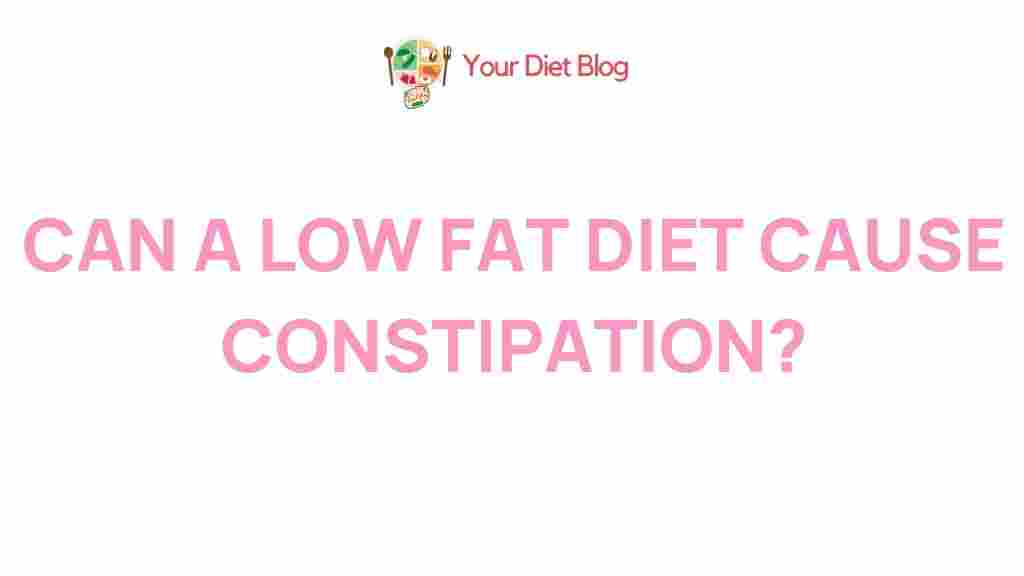Uncovering the Surprising Link Between Low-Fat Diets and Constipation
When it comes to maintaining a healthy lifestyle, a low-fat diet is often touted as one of the best ways to manage weight and prevent chronic diseases. However, emerging research has suggested that adopting a low-fat diet might have unintended consequences, particularly when it comes to digestive health. One such issue is constipation. In this article, we’ll delve into the surprising connection between low-fat diets and constipation, exploring the underlying causes, offering tips for managing this condition, and providing strategies for creating a balanced diet.
Understanding the Low-Fat Diet
A low-fat diet typically involves reducing the intake of fats, particularly saturated fats, while focusing on foods rich in carbohydrates, lean proteins, and vegetables. The goal of this diet is often to reduce calorie intake and improve heart health by lowering cholesterol levels. While this dietary approach may be beneficial for some, it can disrupt normal bowel movements if not carefully planned.
How Low-Fat Diets Can Lead to Constipation
Constipation occurs when bowel movements become infrequent, difficult to pass, or incomplete. There are several ways in which a low-fat diet may contribute to constipation:
- Insufficient Fiber Intake: Many low-fat foods, especially processed ones, are often low in fiber. Fiber is essential for healthy digestion, as it adds bulk to stool and facilitates smoother bowel movements. Without enough fiber, the digestive system may slow down, leading to constipation.
- Reduced Healthy Fats: Healthy fats, such as omega-3 fatty acids found in avocados, nuts, and seeds, play a crucial role in lubricating the intestines and promoting regular bowel movements. A low-fat diet often eliminates these important sources of fat.
- Disrupted Gut Microbiome: Diets low in fats and fiber can negatively affect the balance of gut bacteria, leading to digestive issues, including constipation. The gut microbiome thrives on diverse foods, particularly those high in fiber and healthy fats.
Step-by-Step Process: How to Prevent Constipation on a Low-Fat Diet
If you are following a low-fat diet and struggling with constipation, don’t worry—there are several steps you can take to alleviate this issue:
- Increase Fiber Intake: While reducing fat, it’s crucial to ensure you’re still getting adequate fiber. Focus on incorporating more fruits, vegetables, whole grains, and legumes into your meals. Fiber not only promotes regular bowel movements but also helps prevent bloating and discomfort.
- Include Healthy Fats: Don’t avoid fats altogether. Include sources of healthy fats, such as olive oil, nuts, and fatty fish like salmon. These fats help keep your intestines lubricated, preventing constipation.
- Hydrate Properly: Drinking plenty of water is essential for digestive health. Water helps to soften stool and supports the digestion of fiber. Aim for at least 8 cups (2 liters) of water per day, and increase your intake if you’re consuming more fiber.
- Engage in Regular Physical Activity: Exercise can stimulate your digestive system, helping to prevent constipation. Aim for at least 30 minutes of moderate exercise, such as walking or cycling, each day.
- Consider Probiotics: Probiotics can help restore balance to the gut microbiome and improve digestion. You can find probiotics in foods like yogurt, kefir, and fermented vegetables, or take them as supplements.
Troubleshooting Tips for Constipation on a Low-Fat Diet
If you’ve been following a low-fat diet and continue to experience constipation despite making adjustments, consider these troubleshooting tips:
- Check for Hidden Sources of Fat: Some foods marketed as “low-fat” may still contain significant amounts of hidden fats, such as those from dairy or certain oils. Ensure that your diet is truly low in unhealthy fats and focuses on healthier alternatives.
- Evaluate Your Fiber Sources: If you’re eating more fruits and vegetables but still struggling with constipation, it may be worth evaluating the types of fiber you’re consuming. Some people may respond better to soluble fiber (found in oats, apples, and carrots) than to insoluble fiber (found in whole wheat and bran).
- Monitor Stress Levels: Chronic stress can worsen digestive issues, including constipation. Consider incorporating stress-relief practices such as mindfulness, yoga, or meditation into your daily routine.
Balancing a Low-Fat Diet for Better Digestion
While a low-fat diet can be effective for some health goals, it’s important to strike a balance. Here are a few tips for maintaining a healthy low-fat diet while ensuring optimal digestion:
- Combine Fiber with Fats: Pair high-fiber foods with healthy fats to improve digestion and prevent constipation. For example, add a drizzle of olive oil to your salad or snack on nuts alongside fruit.
- Avoid Overly Processed Foods: Many low-fat processed foods are stripped of nutrients and fiber. Opt for whole, unprocessed foods whenever possible to get the maximum nutritional benefit.
- Experiment with Different Types of Fiber: Different individuals may react to different types of fiber. Some may find that they need more insoluble fiber, while others may benefit from more soluble fiber. Pay attention to your body’s response and adjust accordingly.
Conclusion: Finding the Right Balance
The surprising link between a low-fat diet and constipation highlights the importance of finding a balanced approach to nutrition. While reducing fat intake may offer several health benefits, it’s essential to ensure you’re getting enough fiber, healthy fats, and hydration to support your digestive system. By following the steps outlined in this article and troubleshooting any digestive issues, you can prevent constipation and enjoy a well-rounded, low-fat diet that promotes overall health.
For more information on how to optimize your diet for better digestive health, visit this resource on gut health. Additionally, you may want to consult a healthcare professional to determine the best dietary approach for your specific needs.
Remember, the ultimate goal is not just to eat less fat, but to eat in a way that supports your body’s needs, including proper digestion and gut health. With the right approach, you can enjoy a low-fat diet without sacrificing your digestive well-being.
This article is in the category Nutrition Basics and created by YourDiet Team
